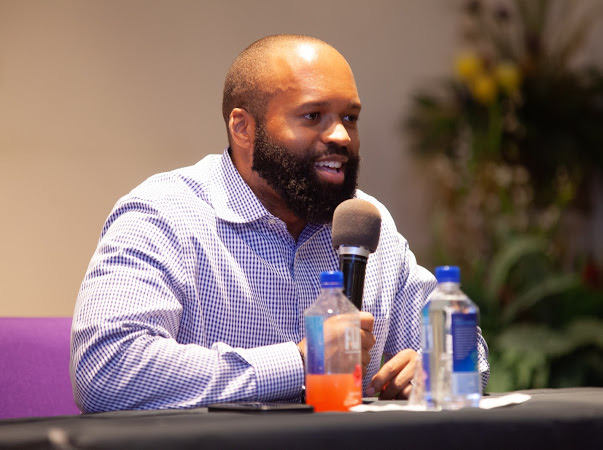In February, Crunchbase published a damning look at venture capital and its pattern of overlooking founders of color. It’s “not a pipeline problem,” the site declared. The problem, it noted, is that VCs aren’t looking for underrepresented founders to forge deals with. And that appears to be true: When, according to RateMyInvestor’s Diversity Report, only 1% of venture-backed founders are Black and 1.8% are Latino, something is going on.
VC consultant and startup founder Pedro Moore has seen a lot of Black and Brown founders lose out on VC funding. But, while the intuitive thing is to blame individuals — i.e. overtly racist VCs — the real issue is more complex, and is rooted in systemic racism.
When SheaMoisture was sold to Unilever in 2017, founder Richelieu Dennis established a $100 million fund for woman founders of color. Such an investment will only go so far in leveling the playing field, according to Moore.
“Everyone keeps talking about the VC funds or the seed funds or the various funds, and don’t get me wrong, those funds are definitely needed,” Moore told Technical.ly. “But in order to get to those funds, the startup has to meet a certain criteria to even get to that stage. And there’s a stage that is really underrepresented for people of color — what I’m going to call the friends, families and angels round.”
In other words, if someone doesn’t have funds to develop their idea to the point where they can go pitch to a VC, it is a pipeline problem. And it’s rooted in years of systemic denial of wealth to Black communities in particular. A poor white founder is going to have trouble finding family and friends to pitch in to their startup, too, but the reason only 1% of venture-funded founders are Black is more complex than not having a rich uncle.
(For an accessible explanation of why this is a systemic racism issue and not simply a class issue, this short clip from “Adam Ruins Everything“ breaks it down to an elementary school level.)
Without the support of systemic wealth, it’s extremely difficult to advance ideas, because there’s no access to the table where the deals are made in the first place.
If someone doesn't have funds to develop their idea to the point where they can go pitch to a VC, it is a pipeline problem.
“The issue is, in my experience, that some of these startups are very early,” Moore said. “I think part of the reason is that many founders of color have great ideas but they’re not able to fully execute them or it takes a lot longer because they don’t have the immediate means within their immediate circle. And even if they did have a rich uncle, that rich uncle may only be familiar with real estate and they’re not going touch it. So as a result of that, the entrepreneur either gives up, or it takes them a lot longer than normal because they’re trying to figure out how to get to the next stage so they can go to a [VC funder] for that seed round.”
The slow road is a common theme for Black founders we’ve talked to, on and off the record.
Moore himself admits that his own startup, FundingFuel, isn’t where he hoped it would be after its first years and many pitches, including two successful rounds of the Black Enterprise pitch competition.
As it happens, FundingFuel is designed to turn the friends and family phase into a crowdsourced angel network, where multiple people people can invest smaller amounts — say, $100 instead of $10,000.
But even if a founder is able to raise funds in the friends and family stage, there’s another roadblock that disproportionately affects founders of color: Most good deals happen through word-of-mouth.
“A lot of Black and Brown founders are not in that circle,” Moore said. “They have to figure out how to get into that circle to get their names circulated. The good news is that there are a lot more [Black and Brown] entrepreneurs now, and they’re producing better products. But as people of color, we have to make sure we’re doing the right things on our end. To get in front and get into the pipeline. We might have to schmooze a little bit [more] and build relationships.”
Simply put, those who want to see more underrepresented founders landing VC funding may do well to shift focus from how VCs invest to how to make the journey to the VC phase accessible.
“We focus on raising capital as the goal in building a business, because there’s a lot of excitement around it,” Moore said. “But one thing I want to emphasize is that we will have to be a little more creative to get things going until time catches up.”

This editorial article is a part of Technical.ly's Technologists of Color Month of our editorial calendar.
Before you go...
Please consider supporting Technical.ly to keep our independent journalism strong. Unlike most business-focused media outlets, we don’t have a paywall. Instead, we count on your personal and organizational support.
Join our growing Slack community
Join 5,000 tech professionals and entrepreneurs in our community Slack today!

The person charged in the UnitedHealthcare CEO shooting had a ton of tech connections

From rejection to innovation: How I built a tool to beat AI hiring algorithms at their own game

The looming TikTok ban doesn’t strike financial fear into the hearts of creators — it’s community they’re worried about


